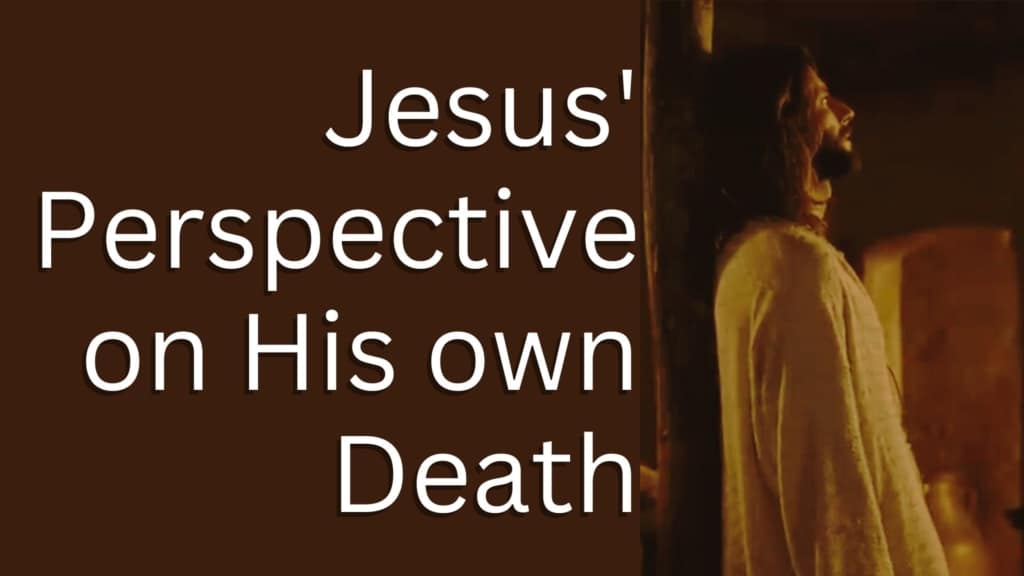- These are Written
- Believe
- Should Not Perish
- 3:16
- Never, Never
- Life, Love, Light
- Condemned by Choice
- This and That
- Seven Expressions of Love from the Cross
- Why?
- I know, I know!
- What?
- UGH!
- Expedient
- Gain Grace?
- The Gift
- The Hands of God
- Immortality
- COME UP HERE
- Not by Works of Righteousness We have Done
- Jesus’ Perspective on His own Death
- I AM
Download or order the free booklet “The Gift” here: https://basictraining.org/the-gift/
Thanks to the American Bible Society “The Gospel of John” for the video scenes.
I want to remind us of the perspective that Jesus, our Savior, had concerning His own death. Because I think it helps us appreciate it a little bit more. His death was 1) Purposeful, 2) Voluntary, 3) Joyful, and 4) Glorious.
Well, first of all, His death was purposeful. He recognized that He was going to die. John 12:27 says, “What shall I say, Father, do not let this hour come upon me. But that is why I came.”
The purpose of his death was also voluntary. It was a voluntary or volitional outpouring of His love, and it showed full and true submission to God, the Father. Romans 5:8, “for God demonstrates his love towards us in that while we were yet sinners, Christ died for us.” In the garden, Jesus said three times to the Father, “not My will, but Your will be done.” In John 10:17-18 Jesus said, “The Father loves me because I’m willing to give up My life in order that I may receive it back again. No one takes My life away from Me. I give it up of My own free will. I have the right to give it up and I have the right to take it back.This is what my father has commanded me to do.”
His death was purposeful. His death was voluntary. His death was also joyful. Hebrews 12:2 says, “Who, for the joy set before Him, endured the cross, despising the shame, and He sat down at the right hand of the throne of God.” Jesus was fully aware of the pain and the suffering that He would face at the cross, but He had his eyes on the joy, and that joy was purchasing our eternal destiny.
And then finally, Jesus considered death as the path to glory. In John 12:23 He said those words, “The hour has come for the Son of Man to receive great glory.” And this is an amazing verse to me because this is shortly before the passion week. This is shortly before He would go through all of that suffering, the betrayal, the arrest, the scourging, the piercing of his hands and feet, the crown of thorns on his head, and the gathering up the sins of the world that pierced His heart. He didn’t say the time has come for the Son of Man to be tortured and tormented and suffer for the sins of the world. No, He said, “the hour has come for the Son of Man to be glorified.” He ignored the suffering and kept his eyes on the glory. And if we can grasp the truth of that verse, it would totally change our perspective of the sufferings in our life.
So this is His perspective of His own death. He was born to die.
Gene Cunningham - April 8, 2000
Simplicity in Christ #10

Simplicity from Prayer
Prayer is a major part of simplifying life. Genuine prayer cannot be separated from the Word of God (Eph 1:15-23, Eph 3:14-20, Eph 6:18). The Lord was compelled to go out and pray (Mar 1:35-38, Isa 50:4, Psa 90:15). God calls us to pray and we don't (Jam 4:2). Prayer is the most often recorded discipline of the Lord in scripture. Jesus exemplified that pray is a necessity for spiritual power and dynamics. The disciples asked why their exorcism wasn't effective; Jesus told them they needed to pray and fast (Mar 9:29).
Jesus and others in scripture set a chosen time in the morning (Mar 1:35, Psa 5:3, Dan 6:10, Lam 3:23). It was a matter of self discipline to the Lord. Jesus found a suitable place. Why did Jesus have to pray? He put a tremendous emphasis on it. The discipline of the Master became the desire of the disciples. Luke 11:1-13 shows the disciples were impressed that prayer was important to Jesus. He taught them to pray by praying after they asked about it.
His prayer had these characteristics:
- Relationship: "Our Father" gives us the right to address Him.
- Fellowship: "Your will be done" acknowledges His rightful role in our lives. God's name is only "hallowed" if we allow His will to be done in our lives.
- Surrender: "Your will be done on earth as it is in heaven". Obedience is necessary, even when we don't like what is happening.
- Dependence: "Give us day by day or daily bread. And forgive us our sins, For we also forgive everyone who is indebted to us." We depend on Him for food, but also forgiveness and grace to forgive others (Mat 6:14-15).
- Deliverence: "And do not lead us into temptation, But deliver us from the evil one". Only being led by the Lord can we be delivered (Rom 8:14).
- Unity: True prayer is not self-centered, but communal.
- Boldness: "Which of you shall have a friend, and go to him at midnight and say to him, 'Friend, lend me three loaves'" (Luk 11:5-8, Heb 4:16).
- Expectency: Prayer is determined to get answers (Luk 11:9-13). Jesus says all prayers are answered. It is God's nature to give (Psa 103:13, Jam 1:17).
- Biblical Priorities: "...how much more will your heavenly Father give the Holy Spirit to those who ask Him!" (Luk 11:13, Eze 36:27, Joe 2:28, Joh 9:37-39). Holy Spirit gave gifts to men (Eph 4:8, 1Co 12:11, Isa 53:12, Eph 1:3). Holy Spirit translates our prayers into what is good for us (Rom 8:26-27).
What kind of impact did the Lord's teaching have on the disciples? "These all continued with one accord in prayer and supplication, with the women and Mary the mother of Jesus, and with His brothers" (Mar 1:35, Act 1:14). We are all in equal standing with the Lord (e.g. women and men). Their prayers were focused (Luk 11:13, Act 1:5-8). The early church was effective in sharing and giving (Act 2:42-47). They devoted themselves to prayer and study (Act 6:1-7). God will not move in a mighty way among unbelievers until we give Him the freedom to move in a mighty way among us believers.
How can prayer make life more simple?
- Prayer fosters harmony among believers;
- Prayer facilitates giving and receiving forgiveness;
- Prayer lifts worry and anxiety off our souls;
- In prayer we find the sustaining power for greater fellowship, guidance from His Spirit, and supply from His Grace.
Life gets complex when we stop living it according to the owner's manual.
Scripture References: Ezekiel 36:27, Mark 1:35, Romans 8:26-27, Romans 8:14, Acts 6:1-7, Ephesians 3:14-20, Luke 11:13, Mark 9:29, Ephesians 1:3, Matthew 6:14-15, Acts 2:42-47, Ephesians 1:15-23, James 1:17, James 4:2, Isaiah 53:12, Luke 11:1-13, Acts 1:5-8, Psalms 103:13, Psalms 90:15, Ephesians 4:8, Lamentations 3:23, Luke 11:13, Luke 11:9-13, Isaiah 50:4, John 9:37-39, Daniel 6:10, Acts 1:14, Hebrews 4:16, Mark 1:35-38, Joel 2:28, Psalms 5:3, Mark 1:35, Luke 11:5-8, Ephesians 6:18






















